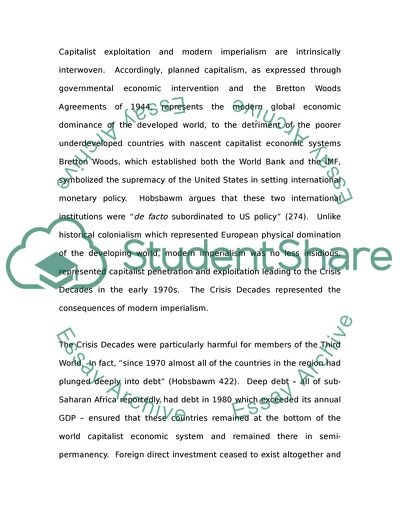
- Home
- Free Samples
- Premium Essays
- Editing Services
- Extra Tools
- Essay Writing Help
- About Us
- Studentshare
- Subjects
- Miscellaneous
- What were the main features of Mordern Imperialism to which Hobson and Lenin drew attention How did their explanation differ
What were the main features of Mordern Imperialism to which Hobson and Lenin drew attention How did their explanation differ - Essay Example

- Subject: Miscellaneous
- Type: Essay
- Level: Undergraduate
- Pages: 4 (1000 words)
- Downloads: 0
- Author: itzelprohaska
Extract of sample "What were the main features of Mordern Imperialism to which Hobson and Lenin drew attention How did their explanation differ"
apitalism and the spread of neoliberal economic policies throughout the developing world best explains the underdeveloped status of much of the world today. Critiques of capitalism and the exploitative nature of this new form of imperialism will be explored with reference to important scholars in the field. The theories of Hobsbawm, Hobson and Lenin will be utilized in this analysis of modern imperialism and we will conclude with a discussion on the differences between Hobson and Lenin with respect to modern imperialism.
Capitalist exploitation and modern imperialism are intrinsically interwoven. Accordingly, planned capitalism, as expressed through governmental economic intervention and the Bretton Woods Agreements of 1944, represents the modern global economic dominance of the developed world, to the detriment of the poorer underdeveloped countries with nascent capitalist economic systems Bretton Woods, which established both the World Bank and the IMF, symbolized the supremacy of the United States in setting international monetary policy.
Hobsbawm argues that these two international institutions were “de facto subordinated to US policy” (274). Unlike historical colonialism which represented European physical domination of the developing world, modern imperialism was no less insidious, represented capitalist penetration and exploitation leading to the Crisis Decades in the early 1970s. The Crisis Decades represented the consequences of modern imperialism. The Crisis Decades were particularly harmful for members of the Third World.
In fact, “since 1970 almost all of the countries in the region had plunged deeply into debt” (Hobsbawm 422). Deep debt – all of sub-Saharan Africa reportedly had debt in 1980 which exceeded its annual GDP – ensured that these countries remained at the bottom of the world capitalist economic system and remained there in semi-permanency. Foreign direct investment ceased to exist altogether and debt servicing, an
...Download file to see next pages Read MoreCHECK THESE SAMPLES OF What were the main features of Mordern Imperialism to which Hobson and Lenin drew attention How did their explanation differ
British Imperialists' Motives in Scramble for Africa
Lenins Theory of Capitalist Imperialism and the Scramble for Africa
IMPERIALISM, VEBLEN
European Imperialism in Africa
The Notion of Imperialism
The Philippines: American Imperialism
Social Imperialism
Imperialism and Significant Impacts on the Victims and Perpetrators

- TERMS & CONDITIONS
- PRIVACY POLICY
- COOKIES POLICY